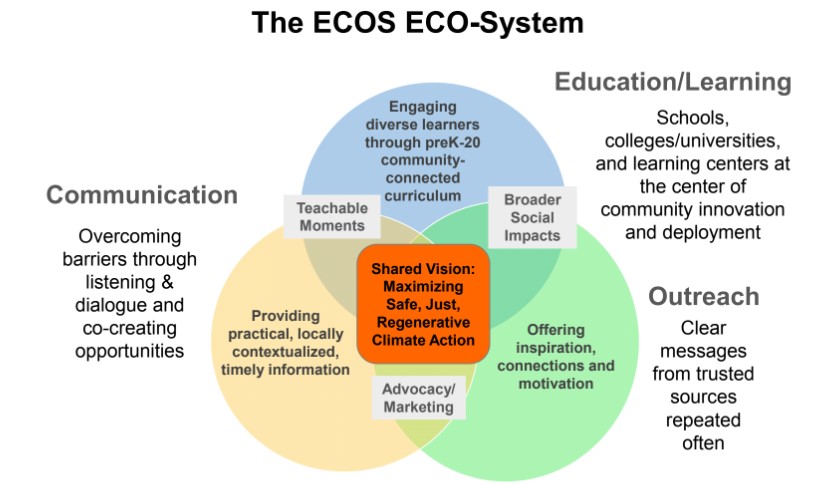Vision Statement
A world of empowered communities, governments, and actors networked to rapidly implement equitable and urgently-needed climate solutions from grassroots to global action.
Mission Statement
ECOS is a coalition of community builders enhancing climate change education, communication, and outreach endeavors of the United Nations Climate Change Secretariat, its member states, and sub-national entities around the world. It fosters collaboration and exchange of transformative knowledge and practices; broadens civic engagement; builds capacity; and shapes policy through a cohesive infrastructure for climate action.
ECOS Statement on Social Justice and Climate Justice
ECOS Activity
The Education, Communication, and Outreach Stakeholder Community (ECOS) was formed in 2016 as a community officially recognized by the United Nations Climate Change Secretariat. ECOS supports effective, innovative efforts to build the capacity of individuals, communities, and organizations (both non-government and government) to make informed climate decisions.
ECOS is a “network of networks” that focuses on civic engagement, capacity building, policy development and climate literacy. We believe that effective, disruptive innovation is imperative to achieve the deep level of transformation required in order to address climate change. ECOS aims to serve the needs of communities and organizations that are involved with climate literacy and information but are outside the United Nations process. Our activities, goals, resources, and services will evolve over time to meet the needs of the ECOS community to build capacity for climate action. We continually seek to identify and lift effective practices and address key opportunities and constraints.

As part of the global effort to reduce the anthropogenic causes of climate change and to support multi-scale actions to minimize the harmful impacts of climate change through resilience and adaptation, the ECOS Community advocates for:
- climate education (lifelong learning and climate literacy),
- climate communication (information sharing and stakeholder interaction for sound decision-making),
- climate outreach (inspiring innovative ideas and actions through meaningful messages,
- climate participation (stakeholder voice as part of collaborative, pluralistic climate governance),
- climate training (improve capacity in any and all relevant areas of climate science and policy, especially in education), and
- climate engagement and empowerment (promoting activities to increase awareness and mobilize action).
ECOS and Action for Climate Empowerment (ACE)
Our community of experts and agents of change actively work towards inclusive and equitable education, access to information, training, public awareness, civic involvement, and international cooperation – key elements of Action for Climate Empowerment(ACE). ACE is the UN program that works to implement the original goals of Article 6 of the UNFCCC, which call for public involvement in developing meaningful and constructive responses to climate change. Implementation of ACE is done through the Doha Work Programme.
The original vision of the United Nations Framework Convention on Climate Change (UNFCCC) was very people-focused. In Article 6 of the Convention, renamed “Action for Climate Empowerment” or ACE in 2015, the parties agreed that education, public access to information, training for relevant professionals, and international collaboration and cooperation would allow the public to be directly involved in developing adequate responses to climate change. However, many parties have been limited to their response to fulfilling their commitments to inform and engage the public and professionals, and efforts to build literacy and the capacity for people to make informed decisions was left largely to motivated individuals and organizations to tackle on their own, often with little support. While there have been some important success stories, they have been the exception rather than the rule.
ECOS aims to support the UNFCCC Secretariat and its ACE efforts and focal points, as well as other stakeholders and enthusiasts working to build capacity for public engagement and informed climate action. A survey conducted in 2018 by ECOS found that the highest priority of the climate education, communication and outreach community is funding, which is an urgent need to nations, communities and individuals seeking to build community capacity to take informed climate action.
ECOS is currently exploring the potential for a Climate Literacy & Engaged Action Response (CLEAR) Fund to help communities around the world develop community-based climate education, communication and outreach engagement and action partnerships and initiatives.
